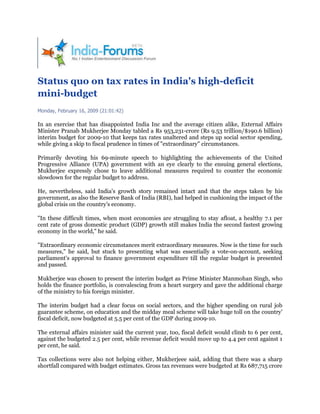
India Forum Feb 16, 2009 Status Quo On Tax Rates In Indias High Deficit Mini Budget
- 1. Status quo on tax rates in India's high-deficit mini-budget Monday, February 16, 2009 (21:01:42) In an exercise that has disappointed India Inc and the average citizen alike, External Affairs Minister Pranab Mukherjee Monday tabled a Rs 953,231-crore (Rs 9.53 trillion/$190.6 billion) interim budget for 2009-10 that keeps tax rates unaltered and steps up social sector spending, while giving a skip to fiscal prudence in times of quot;extraordinaryquot; circumstances. Primarily devoting his 69-minute speech to highlighting the achievements of the United Progressive Alliance (UPA) government with an eye clearly to the ensuing general elections, Mukherjee expressly chose to leave additional measures required to counter the economic slowdown for the regular budget to address. He, nevertheless, said India's growth story remained intact and that the steps taken by his government, as also the Reserve Bank of India (RBI), had helped in cushioning the impact of the global crisis on the country's economy. quot;In these difficult times, when most economies are struggling to stay afloat, a healthy 7.1 per cent rate of gross domestic product (GDP) growth still makes India the second fastest growing economy in the world,quot; he said. quot;Extraordinary economic circumstances merit extraordinary measures. Now is the time for such measures,quot; he said, but stuck to presenting what was essentially a vote-on-account, seeking parliament's approval to finance government expenditure till the regular budget is presented and passed. Mukherjee was chosen to present the interim budget as Prime Minister Manmohan Singh, who holds the finance portfolio, is convalescing from a heart surgery and gave the additional charge of the ministry to his foreign minister. The interim budget had a clear focus on social sectors, and the higher spending on rural job guarantee scheme, on education and the midday meal scheme will take huge toll on the country' fiscal deficit, now budgeted at 5.5 per cent of the GDP during 2009-10. The external affairs minister said the current year, too, fiscal deficit would climb to 6 per cent, against the budgeted 2.5 per cent, while revenue deficit would move up to 4.4 per cent against 1 per cent, he said. Tax collections were also not helping either, Mukherjeee said, adding that there was a sharp shortfall compared with budget estimates. Gross tax revenues were budgeted at Rs 687,715 crore
- 2. (Rs 6,877.15 billion) for the current fiscal and the government now hopes to garner no more than Rs 627,949 crore. quot;Since the scope for revenue mobilization is bound to be limited in a period of economic slowdown, any increase in plan expenditure will increase the fiscal deficit. Indeed, we may have to consider additional plan expenditure of anything from 0.5 per cent to 1 per cent of GDP and gear up our system accordingly.quot; The budget was not totally bereft of new schemes, though not to the extent that was expected. Two new schemes were unveiled - the Indira Gandhi National Widow Pension Scheme and Indira Gandhi National Disability Pension Scheme - for widows and disabled people in the age group 18-40 yeaRs The foreign minister also stepped up the allocation for defence to 141,703 crore (Rs 1,417.03 billion) against the budget estimates of Rs 114,600 crore (Rs 1,146 billion) and justified it saying India was facing a renewed threat perception. quot;We are going through tough times. The Mumbai terror attacks have given an entirely new dimension to cross-border terrorism. A threshold has been crossed. Our security environment has deteriorated considerably,quot; he added. Mukherjee said economic crisis of the magnitude being faced by the developed countries was bound to have an impact around the world, resulting in emerging markets also slowing down significantly. quot;India too has been affected,quot; he said, adding export growth dipped 17.1 per cent in the first nine months, while industrial production fell 2 per cent in December 2008. Soon after he presented the budget, Mukherjee was asked why he decided to ignore tax measures to boost the economy and his reply was that the interim nature of the budget - as opposed to the regular exercise - had placed constraints. quot;That's why I have said that the regular budget needed to address the concerns.quot; But the disappointment from Indian industry was evident, as it found little to cheer but for some sops for infrastructure projects and low-cost housing and the extension of an interest subsidy scheme for exporters till September. quot;Industry did expect that at least the surcharge on corporate taxes would be removed and new corporate tax ceiling introduced,quot; said the Associated Chambers of Commerce and Industry (Assocham), reacting to the measures announced Monday. quot;There was no hint in this direction in the interim budget. Likewise on infrastructure refinancing, the focus is there in the budget but directions are not clearly laid out,quot; the chamber said. Added Harsh Pati Singhania, president of the Federation of Indian Chambers of Commerce and Industry (FICCI): quot;The interim budget has set the direction for the next government and gives a clear message on what steps need to be taken in the months following the general election.quot; The markets also gave a thumbs down to the budget, with the sensitive index (Sensex) of the Bombay Stock Exchange (BSE) extending the morning's losses to 3.35 per cent after
- 3. Mukherjee's speech as investors said the mino-budget merely was primarily packed with data on past performance with little to stimulate growth. quot;The message is loud and clear,quot; said Jagannadham Thunuguntla, chief executive of SMC Group, a brokerage based here. quot;The government seems to be saying that it has done as much as it could and there is no headroom left.quot;
